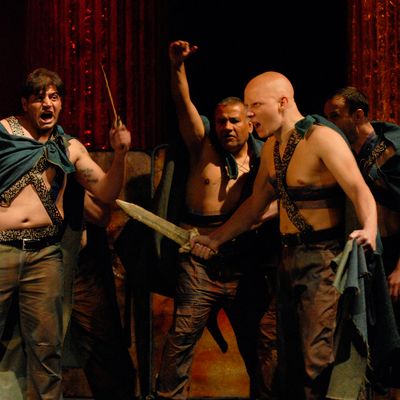
How can anyone not adore Paolo and Vittorio Taviani’s Caesar Must Die? In a scant hour and a quarter, it enlarges your notion of what theater and cinema, what art itself, can do — it dissolves every boundary it meets. Any attempt to pin the movie down reduces it, but this is the setup: A group of prisoners in an Italian maximum-security prison (most with sentences in the teens, some lifers) audition, are cast, and rehearse a production (heavily abridged) of Julius Caesar. Quickly, the roles take over, and we’re watching the play itself.
But reality intrudes — a missed line, a suggestion from the director, a prisoner who breaks off to reflect on the connections between his character’s dilemmas and his own past or present. If that sounds schematic (it does), let me add that there’s little in the way of a one-to-one correspondence between Julius Caesar and the everyday reality of a maximum-security prison. The effect is more suggestive. You’re inside the play and then outside, in and out, until where you literally are doesn’t matter anymore. You’re in a heightened, concentrated space in which every action ripples outward.
The Taviani brothers were inspired by a production of Dante’s Divine Comedy in the Rebibbia prison on the outskirts of Rome, and they went back to Rebibbia to make Caesar Must Die with a cast of inmates and theater director Fabio Cavalli (who plays himself). Throughout the film, you hear the hubbub of other prisoners, the distant opening and closing of steel doors; the actors rehearse in corridors, their cells, and the concrete courtyard on which many of the inmates (and the guards) can look down. It would be too simple to say that murderers, drug traffickers, and members of organized-crime syndicates have a natural affinity for Shakespeare’s backstabbing “men of honor,” but almost from the start they understand the play’s stakes. As Brutus broods on the magnitude of his crime, actor Salvatore Striano seems to be weighing — and regretting — every casual, irreversible decision he has ever made.
Apart from an early and late scene in which the play is performed before an invited audience, Caesar Must Die is in stark black and white, perfect for a world stripped down to its elements. But the oppressive milieu is no match for the language of the play. Finally, men who’ll never again see the world outside their prison walls have a way to soar.


